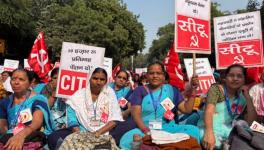Haryana’s Move for Domicile Quota: None to Benefit by ‘Political Stunt’

New Delhi: A proposal by the Manohar Lal Khattar–led BJP government in Haryana to reserve 75% of new jobs for the local population has evoked opposition from industry bodies, trade union activists and academics, though for distinct reasons.
The state cabinet on Monday gave its nod for drafting the ‘Haryana State Employment of Local Candidates Ordinance, 2020’ that seeks to provide 75% domicile quota in new appointments in private sector, drawing salary of less than Rs. 50,000 a month.
The draft of the ordinance is set to be placed before the council of ministers in its next meeting, say reports. Following which, the President’s assent will be required, since labour is a concurrent subject under the Constitution.
This is not the first time that a state government – amidst a crushing job crisis, that has only got worsened due to COVID-19 pandemic – considered a locals-first-policy on the employment front. Last year, in a first, the Andhra Pradesh government made it mandatory for existing and upcoming industries in the state to reserve jobs for locals. Likewise, the Kamal Nath-led Congress government in Madhya Pradesh had also announced a similar domicile quota in industries.
“Such policies decision are driven by a mismatch between labour supply and demand in several states,” said Jayan Jose Thomas, associate professor at IIT-Delhi, whose research deals with labour and industrialisation. “Huge numbers of young migrating workers from states like Uttar Pradesh and Bihar often face shortage of demand in industrialising states, such as Maharashtra and Haryana.” The latter states then seek to manage this over-supply of workers in various ways – one of which is to reserve jobs for locals, he told Newsclick.
This amounts to nothing but a “knee-jerk reaction” as industries continue to have a strong preference for migrant workers, said Nivedita Jayaram, who works with Centre for Migration and Labour Solutions (CMLS), the research and policy unit of Aajeevika Bureau, a Rajasthan-based NGO.
“The employer’s responsibility towards migrant workers can easily be reneged. These workers often migrate to a much more vulnerable social environment, thus also making any legal or political aid out of their reach,” she explained.
Both Thomas and Jayaram agreed that the recent exodus of workers from urban spaces, triggered by the nationwide lockdown, had exposed the exploitative work environment for migrants, that was existing for long. In the aftermath of the exodus, though focus has shifted to generating rural employment, but Jayaram believes that is not enough.
“Migration is going to take place irrespective of such policies. This is because urban wages are often better than rural. What is needed is to bring in regulations that ensure that migrant and local workers are treated at par with each other,” she said.
Thomas agreed and said that such a policy decision would also ensure that local labour was not “unfairly” left out of the labour market.
“If the negotiating power of the migrant workers is increased, then it will eventually benefit the local workforce as well. Making it incumbent on the employer to provide social security and equal wages to migrants will ensure that no undue incentive is being enjoyed by the industry for employing migrants over local,” he said.
The Inter-state Migrant Workmen (Regulation of Employment and Conditions of Services) Act, 1979, that seeks to do the same by providing economic shields to migrant workers, however, remains to be one of the least implemented laws in the country. It is now set to be subsumed under the Occupational Safety, Health and Working Condition Code Bill, which remains silent on safeguards to migrant workers.
Taking away protective provisions meant for migrant workers and bringing “politically motivated” job quotas for local population will only result in further exclusion and stigmatisation of migrant workers in social spaces, according to Jayaram. This may also drive down already depressed wages of migrant workers, she added. The industry, though, had a different take for opposing such a policy decision.Major K C Sandal, vice president of Gurgaon Industrial Association , feels that the move is not feasible, which is being taken while “not taking into consideration industry needs in post-COVID times.”
“Locals are not skilled enough. They are not suitable for industrial jobs since they lack the required discipline and often engage in hooliganism,” Sandal says.
Likewise, Manmohan Gaind, general secretary of Manesar Industrial Association, termed it a “draconian” move, which will invite bribes and fines. “As many as 80% of workers in Manesar are migrants. It is nearly impossible now to switch to the local population. It is surprising that such a move is being considered when already industries are reeling under the pressure of COVID-19,” he said.
Satbir Singh, general secretary of Centre of Indian Trade Union (CITU) – Manesar unit, termed the Haryana government’s move as a “political stunt”. “When there are not enough jobs, the government is trying to fool the locals by announcing reservations,” he said.The government’s intention is to create a rift between the locals and migrant workers and keep the working class divided, he added.
Get the latest reports & analysis with people's perspective on Protests, movements & deep analytical videos, discussions of the current affairs in your Telegram app. Subscribe to NewsClick's Telegram channel & get Real-Time updates on stories, as they get published on our website.
























